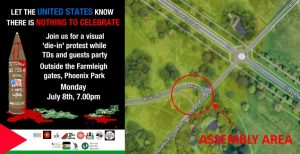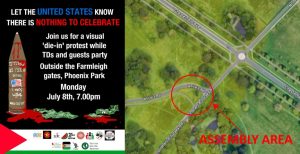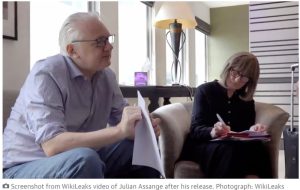An uncertain future for Syria’s revolution
For a longer version of this piece go to www.socialistworker.co.uk
Yet when I arrived at Damascus airport in December, I saw little sign of the revolution. I had left Syria a year earlier, a couple of months before the uprising started. Back then there was just the one big portrait of President Bashar al-Assad. Now the airport was full of Assad portraits, even in the little cabinets where police officers sit to stamp passports.
Damascus, the Syrian capital, is considered one of the major bases for the regime. I was heading to my home city of Salamiyah. It is located near Homs and Hama—the two major cities to revolt against the regime. I passed four military checkpoints between Homs and Salamiyah, fully equipped with heavy arms and tanks. The place seemed like a battlefield.
At one point soldiers boarded my bus and searched it very thoroughly. They weren’t looking for terrorists or dissidents. They were searching for young men born in 1992 to immediately conscript them into compulsory military service.
This new generation of young men are refusing to military service because they don’t want to kill their own people, and neither do they want to die at the hands of the armed elements of the uprising. This is especially true for youths from the revolution’s hotspots: Homs, Hama, Deir ez-Zor and Idlib.
Transformed
On reaching Salamiyah I felt a freedom that I’d never previously experienced in my life. The people that I knew had transformed themselves in the space of less than a year.
An uncertain future for Syria’s revolution
For a longer version of this piece go to www.socialistworker.co.uk
Yet when I arrived at Damascus airport in December, I saw little sign of the revolution. I had left Syria a year earlier, a couple of months before the uprising started. Back then there was just the one big portrait of President Bashar al-Assad. Now the airport was full of Assad portraits, even in the little cabinets where police officers sit to stamp passports.
Damascus, the Syrian capital, is considered one of the major bases for the regime. I was heading to my home city of Salamiyah. It is located near Homs and Hama—the two major cities to revolt against the regime. I passed four military checkpoints between Homs and Salamiyah, fully equipped with heavy arms and tanks. The place seemed like a battlefield.
At one point soldiers boarded my bus and searched it very thoroughly. They weren’t looking for terrorists or dissidents. They were searching for young men born in 1992 to immediately conscript them into compulsory military service.
This new generation of young men are refusing to military service because they don’t want to kill their own people, and neither do they want to die at the hands of the armed elements of the uprising. This is especially true for youths from the revolution’s hotspots: Homs, Hama, Deir ez-Zor and Idlib.
Transformed
On reaching Salamiyah I felt a freedom that I’d never previously experienced in my life. The people that I knew had transformed themselves in the space of less than a year.
This was despite the fact that strikes and protests against the regime had been at a relatively low level since beginning of September. That was when police, security forces and the mercenaries known as the Shabiha—Arabic for “ghosts”—launched a joint operation to uproot the city’s opposition movement. They conducted house-to-house arrests for around three days.
Most of the democracy activists are waged workers, including a huge number of public sector employees involved in the protest. One of their key slogans is, “We are not hungry—but we need our dignity back.”
On 15 December I attended a meeting organised by leftist activists in Salamiyah where they received a number of refugees from Homs. All the issues around the revolution were discussed freely—especially the question of outside intervention in Syria.
The idea of outside intervention is becoming more popular in Syria, especially inside the revolution’s hotspots. But myself and two other activists spoke out against any form of international intervention. We want to oust Syria’s dictatorial regime, but we do not want reduce Syria to a pile of bones passed between the jaws and paws of international powers.
Factions
Other forces on the left, I regret to say, remain loyal to the regime. The Syrian Communist Party split in 1986, but both factions are supporting Assad, even as the death toll in Syria rises to 6,000. They dismiss the opposition with conspiracy theories. A large number of Communist activists have left the party as a result of this stance.
One Assad supporter asked me, “You are leftist who supports Venezuela’s president Hugo Chavez against the imperialists. So why aren’t you supporting Chavez’s ally Assad?”
I replied that this is a revolution against the regime in Syria. I am with the people and against imperialists. Supporting the revolution does not means that allying with imperialists or being blind to their agenda. I don’t want outside intervention—I want Assad to listen to the angry masses and negotiate with the opposition movement rather than suppressing it.
The Assad supporter objected that a section of the opposition—the Syrian National Council, established in Istanbul last October under the patronage of the US, European Union and Gulf states—was actively helping imperialist interests.
But I pointed out that opposition is not confined to the SNC.
If Assad wants the opposition to support him against imperial powers, he should stop killing opposition activists and let people to democratically decide who rules over us. Instead Assad is talking up the idea of outside intervention to try and curry favour among leftists.
The future of Syria is deeply uncertain. The regime is busy arming its supporters with Kalashnikov rifles and pump-action shotguns. Sections of the opposition under patronage of neighbouring states are doing the same.
The Syrian regime needs to understand that rules have changed. If it seriously wants to avoid outside intervention, it needs to change itself.
Nebras Dalloul is a leftist Syrian activist currently based in the United Arab Emirates. For a longer version of this piece go to socialistworker.co.uk
© Socialist Worker (unless otherwise stated). You may republish if you include an active link to the original.






